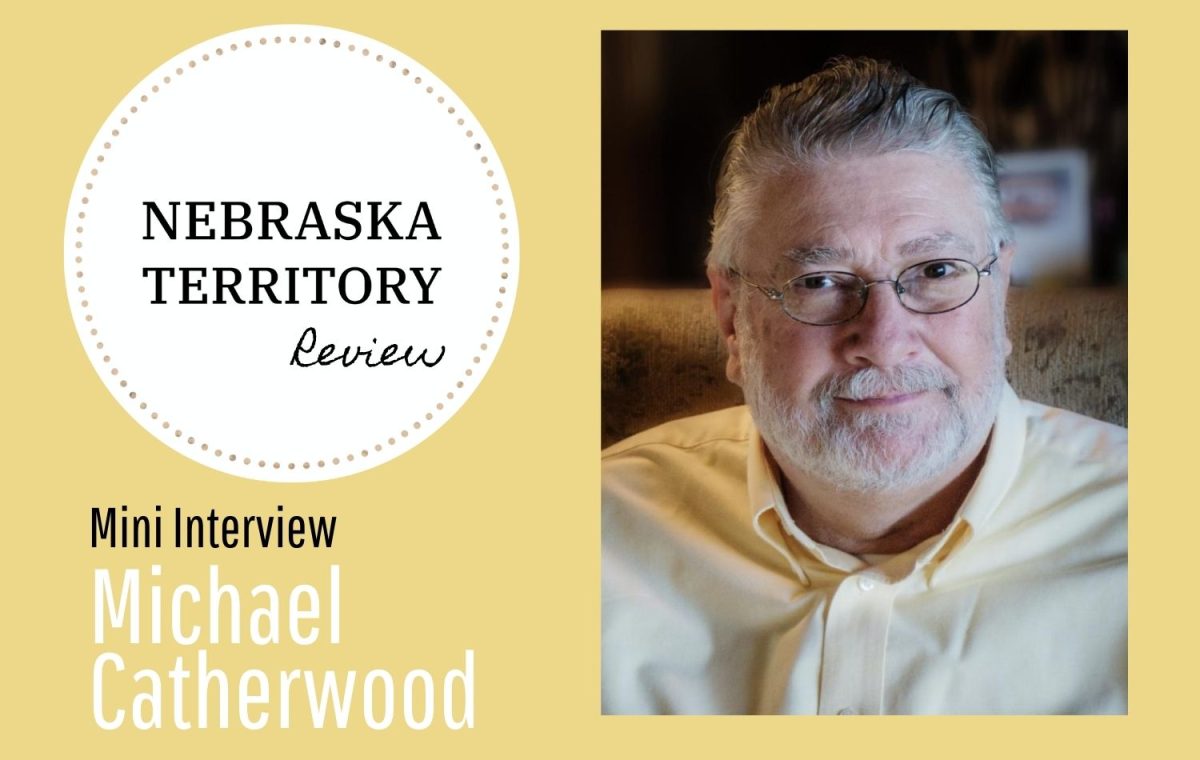How did you get into writing? Do you remember your first piece of writing?
I would say it was a convergence of things: I took a lit course from an Ursuline Sister at Rummel High School, who taught American Poetry. Poe, Hughes, Crane, Lowell, and others really inspired me. I loved that course. Rummel was an all-boys school, so admitting my enthusiasm was something I couldn’t do, but my dad encouraged me as we always had books around, and my dad would recite bits of Shakespeare between shifts at the Post Office. Also, my brother Mark and I loved rock music, and we were always deciphering lyrics from The Doors, The Who, Jimi Hendrix, Steppenwolf, and such. I would also say my first piece of writing, besides writing on the board, “I will not interrupt Mrs. Johnson in class …” was attempting song lyrics. I latched onto metaphor and simile quickly.
How does living in the Great Plains influence your perspective and your writing?
Greatly. The landscape cannot be ignored. It’s a huge part of us in this section of the country—it has a kind of quiet spiritual presence. Motifs of sky, fences, crops, earth, distance, seasons, gravel roads, dust, on and on, dot my poems, and often work as triggers for my work. Many new poems seem to be focused on these even more so. I ride motorcycles for regeneration, to inhale the world, and living in Omaha provides a quick escape into the Loess Hills and rolling landscape. We’re lucky to have such quick access to what I consider to be serenity.
What inspired Near Misses?
There’s a Buster Keaton film where he stands in front of a building and the front collapses down all around him. The dust settles, and there’s Buster, standing in the doorway, unharmed. That was the idea. Near Misses became Near Misses many years ago, when during Xmas break, I wrote quick paragraphs every day on subjects on defying close calls in my previous life. Let’s just say, I was a Rambler and leave it at that. My nickname has always been “Cat,” mainly because of my last name, but also because of close calls. In many cases, there’s a bit of humor connected to the poems, partly a survival technique. The book became a nod to friends, too: the cover is by Arturo Cruz, Susan Aizenberg wrote a blurb and is a longtime friend from my days at the UNO Writer’s Workshop, and Creighton; Austin LaGrone, wrote a blurb and is a poet and former student of mine at the University of Arkansas, a spiritual brother. And Chad, who let me do all these things in creating the book. Not easy to find, btw.
What authors give you writing inspiration, and what authors do you simply enjoy reading?
Robert Lowell does both; Weldon Kees is my god. Wordsworth’s blank verse, early Robert Bly, Simic, H.D., and even numerous breathing poets, many from the plains: Greg Kosmicki, David Wyatt, JV Brummels, Susan Aizenberg, Erin Belieu… Many prose writers inspire me in my poetry: Hunter S. Thompson, George Orwell, David Means. Lots of translated poets: Lorca, Tranströmer, Baudelaire, Mandelstam… The list constantly changes as I’m buying books, more than I can read.
Do you have a writing routine? Do you have any writing tools or methods?
Routines have changed over the years. Early on, I always wrote first drafts in longhand in pocket notebooks, mostly, as I was a daily truck driver, and attended undergrad school nights. I typed everything up on my mother’s old Royal ribbon boat anchor and the action of the keys hitting the paper was invigorating. A kind of cadence. Pop, pop, pop! Now, I write as it hits me, which is a lot. I’m not the kind of poet who sits down every day at 7am or 2pm and writes. Blah. I write a lot as it is.
Retirement has helped my loosey-goosey process. I’ve always been able to store images and lines and rhythms in my mind. This keeps my writing fresh for me, allowing some discovery. I like coming back to a new idea or image or angle.
Editing is more deliberate and like the action of a brush or comb. I go through 10 to 20 drafts of almost all my poems, searching out what are overdone objects or tropes I tend to use. Much of my energy is in the poem’s line. Lines are what I do. A line can be a poem.
What do you find inspires your writing?
Being outside, some days. Other days, at rest at home, both allowing images and my senses to guide ideas. A lot of my poems are close to memoirs, even more so these days. Not sure if that’s good or bad, but that’s what’s going on now. I have a lot of complicated health issues, and that subject sits just off-stage. I’ve lived a pretty full life so there always seems to be material to explore and exploit. I operate with the hope that something will reveal itself to me, a launch, a new way to see something, a moment of peace or disruption. I’m game for it all.
What is the hardest thing about writing, and how do you work through it?
Writing books is hard, good books. I don’t just slam stuff in a manuscript. There must be selection and excision. I had poems in the staging-area folder for a decade or more that worked in my last book, Near Misses. It felt good to give them a place that they were resurrected. Poems are friends, you know. Some needed work and others were close to ready. Then there’s always the editing and grammar and lines and craft that I feel needs to be correct for me. As I mentioned before, reworking some of the recurring images and tropes (figures of speech) takes time and reflection.
Oh, and rejection is hard, too. At my age, I don’t care much about that; I just get over it and go to battle.
Are you working on anything currently?
Two manuscripts are fighting it out, and I’m always writing, so I try to keep the hot streak going since I’m able to in retirement. As these manuscripts are shaping up, they do seem to have two very different personalities. A natural process that I feel takes time to develop. I’m starting to see some poems that will go into a third manuscript. So, I feel good about all that. There’s also always a blend of things in any strong book. A good blend of ingredients makes for a good stew… Right?
What advice would you give to aspiring writers?
Find your favorite poets, fiction writers, and painters and study their techniques and themes. Notice how they move from one book to another, one image to another, one section to another, one poem to another, one line to another. It all connects and flows and scratches forward. Find your subjects and dig in, mine deep, celebrate them, let them lead you. They are yours. And you will know them when you find them. Write like a bus might run your ass over tomorrow, or maybe cancer sits in your driveway, waiting for you. Feel lucky you get to write, have and make time to write, have friends who write. GD, you can’t beat that.
Is there anything else you would like to add?
As I mentioned before, make connections to other people, editors, struggling writers, people at readings, artists in your daily life, poets and prose writers sharing their work––buy and read their books. These people are very important.
Keep your eyes open, your heart open, believe the sky and cherish the earth and be ready, because it’s all out there, alive or dying or changing, always changing, growing, decomposing, replenishing, drifting away, and quietly waiting at the edges.
About the Author
Michael Catherwood’s awards include a Nebraska Arts Council Grant, Pushcart Nomination, The Holt Prize for Poetry, and Finalist for the Ruth Lily Prize. His books are Dare, If You Turned Around Quickly, Projector, and of course, Near Misses from WSC Press. He is a former editor at The Backwaters Press and has been Associate Editor at Plainsongs since 1995. Recent poems have appeared in The Common, Pennsylvania English, I-70 Review, and Common Ground Review. He’s a cancer survivor, recently retired, and lives in Omaha with his wife, Cindy.
Follow Michael Catherwood:





